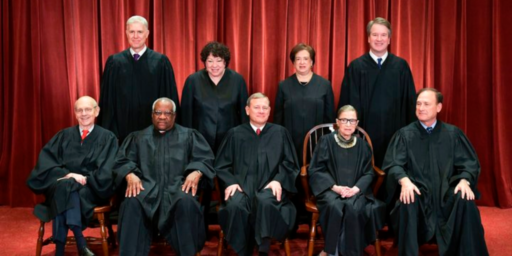“Personhood” Amendments Fail In Two States
Another setback for the radical fringe of the "pro-life" movement,
Among the issues that voters faced at the polls around the country on Tuesday were so-called “personhood” amendments which would have defined life as being at conception and marked a radical step forward in the abortion wars, which were on the ballot in two states, in one case for the third time in six years, and lost in both states:
The anti-abortion personhood movement failed key tests Tuesday in North Dakota and Colorado, with voters rejecting amendments to grant the unborn constitutional rights.
In North Dakota — a strongly anti-abortion state considered the personhood movement’s best chance of victory — the proposed ballot measure would have amended the state constitution to say the “inalienable right to life of every human being at any stage of development must be recognized and protected.” The Associated Press reported that with 91 percent of precincts reporting, it was losing by about a 2 to 1 margin.
Personhood supporters had hoped a victory in North Dakota would give the movement its first win and galvanize other states to act. Opponents of the measure — Measure 1 — warned that the new language could restrict access to abortion even before viability, criminalize in-vitro fertilization or limit end-of-life treatment choices. Planned Parenthood, which backed the opponents, poured hundreds of thousands of dollars into the race. The Catholic bishops did the same for the supporters.
In a statement on the North Dakota results, Center for Reproductive Rights President Nancy Northup said, “The voters have sent a loud and clear message: Women know what’s best for their lives, their health, and their futures. It’s time for North Dakota politicians to remember that message when they return to the capital for a new session in January.”
Voters in Colorado already defeated personhood in 2008 and 2010, and on Tuesday they rejected Amendment 67 overwhelmingly, according to the AP. The amendment to the state’s constitution would have granted personhood rights to an unborn child in the state’s criminal code.
These are the latest defeats for a movement that, notwithstanding many of the advances that anti-abortion forces have made on the state level since the 2010 elections when Republicans scored big victories in state legislatures across the country, still seems to represent the radical fringe of the conservative movement. The fact that such a measure lost in deeply red North Dakota is significant, of course, while the loss in Colorado suggests that, while being a purple state where, as Cory Gardner proved, Republicans can win statewide, is not a state where conservative issues are a winning position. Gardner seems to have realized that early on given the fact that he quickly distanced himself from the personhood measure after beginning his run for the Senate and, during the course of his campaign came out in favor of making the sale of birth control pills over the counter legal. To a large degree, that helped to undercut efforts by Mark Udall’s campaign to turn the women’s vote to their favor in the state. Perhaps the most significant indication of just how radical the “personhood” movement really is, though, came three years ago in Mississippi where one of these Amendments failed to win voter approval by an overwhelming margin. So clearly, there are limits to how far the anti-abortion movement can go politically even in states where they would seem to be the most politically powerful.
At the same time that the personhood amendments went down, of course, there are other battles on the abortion wars front. New regulations on abortion clinics in Texas are the subject of ongoing Federal litigation, for example, and voters in Tennessee approved a change in that state’s Constitution that would give the legislature more authority to regulate abortion:
Voters in Tennessee narrowly approved a ballot initiative on Tuesday night that rolls back constitutional protections for abortion, opening the door for their lawmakers to impose additional restrictions on the procedure. While the passage of Amendment 1 doesn’t have immediate ramifications, residents of the state will likely start feeling its effects soon enough.
Amendment 1 will amend language in Tennessee’s constitution so that abortion is no longer defined as a “fundamental” right. That effectively reverses a 2000 Tennessee Supreme Court ruling that established broad protections for reproductive rights, raising the bar for the types of barriers to abortion that the state was allowed to enact.
Now, a paragraph will be added to Tennessee’s constitution to explicitly state that “nothing in this Constitution secures or protects a right to abortion or requires the funding of an abortion” and “the people retain the right through their elected state representatives and state senators to enact, amend, or repeal statutes regarding abortion, including, but not limited to, circumstances of pregnancy resulting from rape or incest or when necessary to save the life of the mother.”
So next session, state lawmakers will be free to pass the types of legislation — like mandatory waiting periods and forced ultrasounds — that used to be out of reach to them. Plus, there are plenty of abortion restrictions that weren’t covered in the scope of the 2000 court ruling. The legislature may be galvanized by the fact that voters just endorsed Amendment 1 to go ahead and pass some of those, too.
“There’s a laundry list of abortion restrictions that the Tennessee legislature could pursue in 2015,” Elizabeth Nash, the states issue manager at the Guttmacher Institute, told ThinkProgress. “Certainly with this amendment approved by the voters, the argument can be made that now they can really go forth and wreak havoc on abortion access in Tennessee.”
Nothing about the changes in Tennessee, of course, precludes whatever might be passed from being challenged in Federal Court. However, the record of those courts in respect to the most recent types of regulations directed at abortion clinics, which have often been cloaked in the veneer of regulations about overall safety and such, is mixed at best and, so far at least, the Supreme Court has not weighed in on the issue on one side or the other. In some ways, that is because abortion rights groups have been reluctant to push the issue that far for fear that, under the current make up of the Court they could end up with an adverse decision that could do the cause of abortion rights more harm than good. At some point, though, some of these state laws are going to have to be tested at the Supreme Court level. That could be the case currently pending in the Fifth Circuit dealing with the Texas laws which, interestingly enough, the Court recently granted a stay in by a 6-3 vote. What that means for a future ruling on the merits, though, is entirely unclear.
The lesson to draw from Tuesday, though, is that while there remains public support for some restrictions on abortion, a fact that is unsurprising given that the American people remain hotly divided on this issue and always will be, there are some areas where the radical elements of the so-called “pro-life” movement are simply far too out on the radical fringe to succeed politically. One wonders if they will learn that lesson at some point.







For a party who loves to scream about the unintended consequences of legislation, the notion of “person-hood” for a blastocyst has implications that none of these people have thought through. When do we start assigning fetal rights lawyers to all pregnant woman?
Why, they will never learn this lesson, since for them its a faith issue. The question is why does the Republican Party cultivate these voters?
Answer: Because its politically convenient for the big business moneymen who support the Republican Party.Right now its very convenient for them, since it drives these one issue voters to the polls election after election, where they vote in Republicans, who vote for low taxes on rich, voting restrictions for low income voters, etc.
When it be comes inconvenient for the establishment, you will see Republican support for “personhood amendments” fall away, which is why Corey Gardner and Joni Ernst suddenly abandoned their support for such amendments when they ran for state wide elections in purple states.
@Rick DeMent: It’s impossible to parody this stuff. Alabama Abortion Law Puts Minors on Trial and Gives Their Fetuses a Lawyer
@stonetools:
From what I’ve read, many if not most big business support both Republican and Democratic parties – why bet on one horse if you can own both?
It certainly is politically convenient for them to keep people occupied with this kind of issue, though.
I will remind people that Roe v Wade was not particularly controversial at the time. Protestants mostly defined “life” as starting at birth. It was only when opposing abortion rights became highly profitable that it became a big deal. Now, after a generation of opposing it, beliefs have completely hardened and it has become the sole issue for the activists. A prime example of conservatives believing their own BS. And as @stonetools: notes, it’s been a very useful tool for Republicans to get the rubes to vote against interest.
Gardner immediately distanced himself from personhood politics at the state level and denied he supported the same policies at the federal level but he never took his name off support for the Life at Conception Act sponsored by Rand Paul. It’s interesting that toward the end of the campaign Rand Paul did not come to Colorado as a speaker at the “Rediscovering God in America” event sponsored by the Colorado Renewal Project. “Paul’s [proposed] visit to Colorado raised eyebrows because Colorado senatorial candidate Cory Gardner has been telling reporters that there is “no federal personhood bill”–and Paul is the unabashed sponsor of a federal personhood bill, called the Life at Conception Act.” Colorado Pols.
It’s important to note that Cory Gardner supported personhood for semen…but then ran away from it when it became apparent it was a political loser of a position.
http://www.rightwingwatch.org/content/personhood-leaders-halloween-costume-stabbed-back-cory-gardner
Hate and anger made people check off Republican candidates who represent abstract ideas…but the reality is that people do not like the specifics of the Republican agenda.
Pot Legalization.
Marriage equality.
Contraception.
Background checks.
Tax cuts for the rich.
The pre-Obamacare status quo
Republicans are on the wrong side of every issue. But they stoke hate and fear like nobody else. They are selling abstractions…and have nothing to offer the real world.
@C. Clavin:
Oh FFS. Every sperm is sacred was satire. It’s the political equivalent of Poe’s law.
Can someone explain the theological rationale here? I thought I understood Catholicism reasonably well, but this has me baffled. Who is harmed if a zygote is prevented from dividing, or discarded before it has a chance to get started? Nothing suffers, nothing feels loss, nothing has any psychological states at all. And if the zygote’s theological status is “unbaptized infant”, current official doctrine holds that
If embryos run a real risk of eternal damnation, why has there been no attempt in the entire history of the Church to find a way to baptize embryos? Miscarriage has always been a real concern; I would think that would drive the Church to work hard to save its potential victims if they are potentially subject to damnation.
(Let me pause a moment to be bemused by the notion that an individual might suddenly wake up in Heaven (or Hell), fully aware and blissful (or tormented), having never had any previous existence other than as a zygote…)
@rudderpedals:
And indeed…it is intended as a parody of their extremist view.
@C. Clavin:
In other words…if Republicans say what they really think…they would never get elected.
Cory Gardner is one example.
Mitt Romney and the 47% is another.
3rd time a personhood vote has failed in Colorado. Hopefully we’re about done with them.
@Mr. Prosser:
@C. Clavin:
My daughter lives in Denver and she occasionally passed along anecdotes about Gardner’s campaign and his support of ‘personhood.’ She said that it’s too bad the Democratic opposition was so weakened, because Gardner is a sleazy grease ball.
I suspect the ‘personhood’ issue changed no minds – conservatives and independents were not going to bail on Gardner because of this issue, to them it was more important to dump the incumbent Democrat. Gardner could probably have supported financing a statue of Bin Laden to be placed on the statehouse grounds and he would have won.
@al-Ameda: I’m not sure everyone was that down on Udall but he ran such a poor campaign. Just about all he emphasized was personhood and women’s rights; in fact the opposition began calling him Mark Uterus. He rarely hit on what he did for the state and was rarely seen here on the Western Slope. Frankly, I think he was too timid.
@Mr. Prosser:
I agree with you. And Udall’s timidity was duplicated by many Democrats across the country, they were very defensive and did not carry the fight to Republicans. From the beginning they were running away from the President, and from core Democratic issues. A big mistake.
@Mr. Prosser:
I understand he didn’t attack Gardner for voting to deport the dreamers. But honestly, he most likely would have won with the 2012 electorate. Fundamentals tend to trump tactics.
@DrDaveT: I appreciate the up-votes, but I’d be even happier with an answer to the question. Anyone have any idea what the official line is on this one?